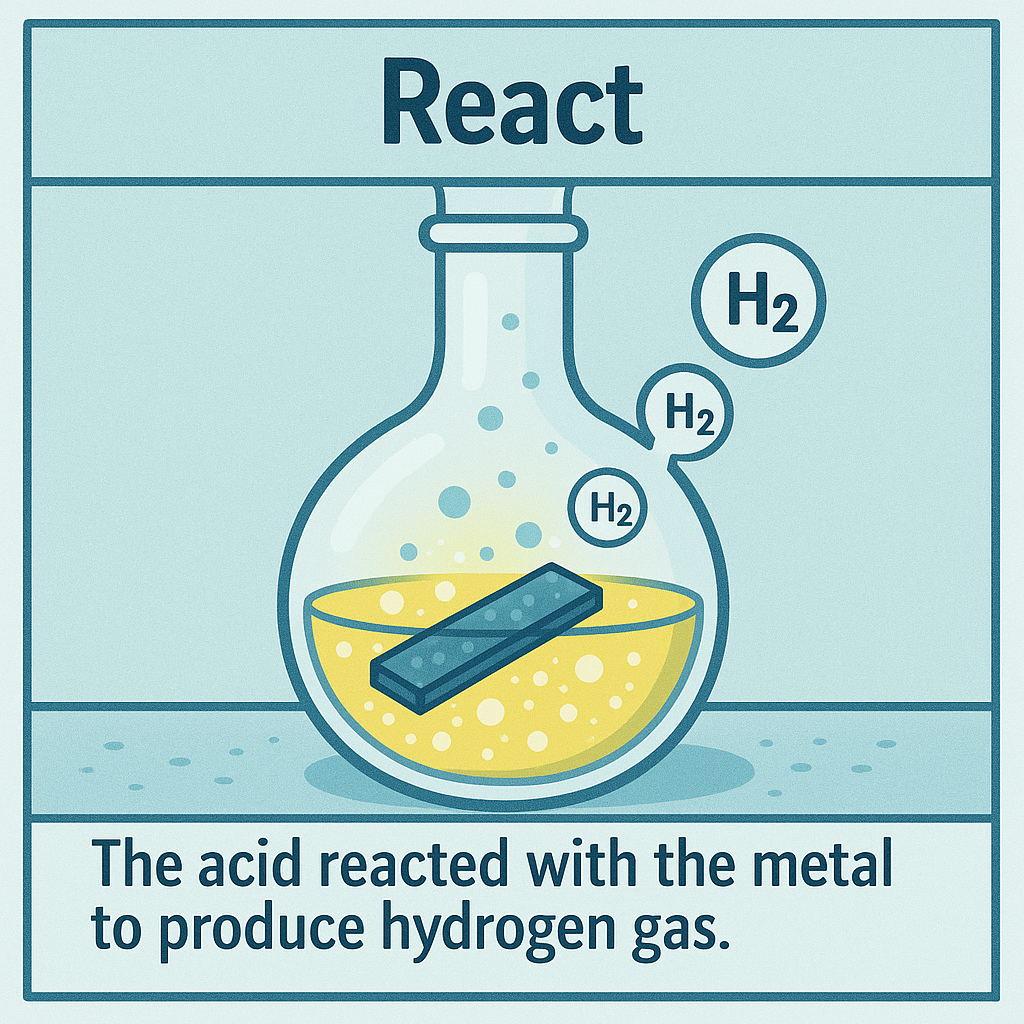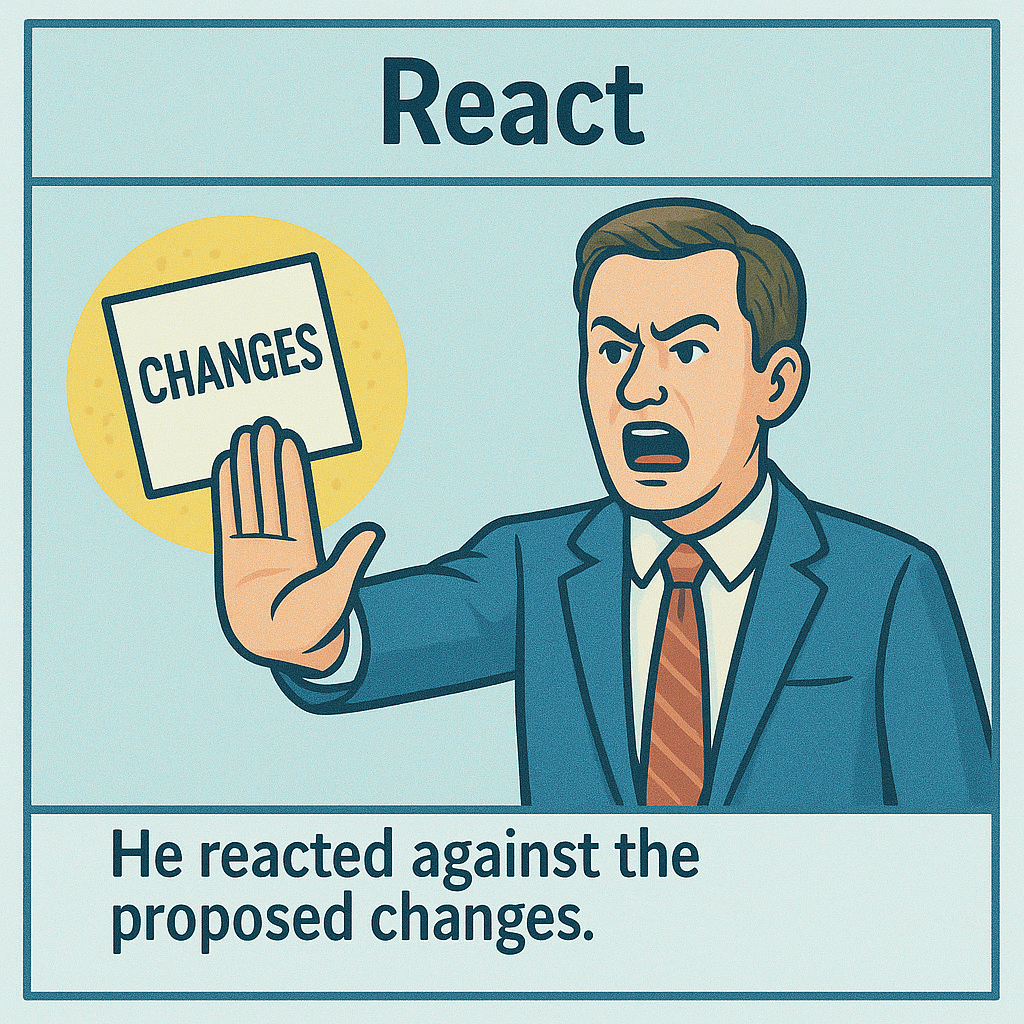React
Definition
The term "react" describes the act of responding to a stimulus, event, or situation, or undergoing a chemical change as a result of interaction with another substance.
Parts of Speech
- Verb
Pronunciation
American English
- IPA Pronunciation: /riˈækt/
- Respelling: ree-AKT
British English
- IPA Pronunciation: /riˈækt/
- Respelling: ree-AKT
Etymology
The word "react" originates from the Latin "reactus," meaning "to act back," derived from "re-" (again) and "agere" (to do, act). It entered English in the early 17th century.
Derivatives
- Reaction (noun)
- Reactive (adjective)
- Reactivity (noun)
- Overreact (verb)
- Reactance (noun, technical)
Synonyms
- Respond
- Answer
- Counter
Antonyms
- Ignore
- Neglect
- Overlook
Usage
The term "react" is commonly used in everyday language, scientific contexts, and emotional responses. For example: "She reacted quickly to the unexpected news," or "The chemicals reacted violently when combined."
Related Terms
- Response: An action or feeling elicited by a stimulus.
- Interaction: The reciprocal action or influence between entities.
- Adapt: To change or adjust in response to new conditions.
Detailed Definitions
Verb
- To respond to a stimulus or event: Refers to taking action or showing emotion in response to something.
- Example: "The audience reacted positively to the speech."
- To undergo a chemical change: Refers to substances interacting and transforming chemically.
- Example: "The acid reacted with the metal to produce hydrogen gas."
- To act in opposition or resistance: Refers to responding negatively or pushing back against something.
- Example: "He reacted against the proposed changes."
react



🇨🇳 Mandarin
- 反应 (fǎnyìng) - to respond
- IPA Pronunciation: /fa˨˩˦jiŋ˥˥/
- English Respelling: fan-ying
- 反应 (fǎnyìng) - a substance undergoing a chemical reaction
- IPA Pronunciation: /fa˨˩˦jiŋ˥˥/
- English Respelling: fan-ying
🇮🇳 Hindi
- प्रतिक्रिया करना (pratikriya karna) - to respond
- IPA Pronunciation: /pɾət̪ɪkɾɪjaː kəɾnə/
- English Respelling: pruh-ti-kri-ya kar-na
- अभिक्रिया करना (abhikriya karna) - a substance undergoing a chemical reaction
- IPA Pronunciation: /əbɦɪkɾɪjaː kəɾnə/
- English Respelling: ab-hi-kri-ya kar-na
🇪🇸 Spanish
- Reaccionar - to respond
- IPA Pronunciation: /reakt͡sjoˈnar/
- English Respelling: ray-aks-yo-nar
- Reaccionar - a substance undergoing a chemical reaction
- IPA Pronunciation: /reakt͡sjoˈnar/
- English Respelling: ray-aks-yo-nar
🇫🇷 French
- Réagir - to respond
- IPA Pronunciation: /ʁeaʒiʁ/
- English Respelling: re-ah-zheer
- Réagir - a substance undergoing a chemical reaction
- IPA Pronunciation: /ʁeaʒiʁ/
- English Respelling: re-ah-zheer
🇸🇦 Modern Standard Arabic
- رد الفعل (rad al-feal) - to respond
- IPA Pronunciation: /ræd ælfʕæl/
- English Respelling: rad al-feal
- تفاعل (tafa'ol) - a substance undergoing a chemical reaction
- IPA Pronunciation: /tæfæʕɔl/
- English Respelling: taf-aol
🇧🇩 Bengali
- প্রতিক্রিয়া করা (pratikriya kôra) - to respond
- IPA Pronunciation: /prot̪ikria kɔra/
- English Respelling: pro-ti-kri-ya kor-a
- প্রতিক্রিয়া করা (pratikriya kôra) - a substance undergoing a chemical reaction
- IPA Pronunciation: /prot̪ikria kɔra/
- English Respelling: pro-ti-kri-ya kor-a
🇷🇺 Russian
- Реагировать (Reagirovat') - to respond
- IPA Pronunciation: /rʲɪɐˈɡʲirəvətʲ/
- English Respelling: re-ah-gee-rov-at
- Реагировать (Reagirovat') - a substance undergoing a chemical reaction
- IPA Pronunciation: /rʲɪɐˈɡʲirəvətʲ/
- English Respelling: re-ah-gee-rov-at
🇵🇹 Portuguese
- Reagir - to respond
- IPA Pronunciation: /ʁɨaˈʒiɾ/
- English Respelling: re-a-zheer
- Reagir - a substance undergoing a chemical reaction
- IPA Pronunciation: /ʁɨaˈʒiɾ/
- English Respelling: re-a-zheer
🇮🇩 Indonesian
- Bereaksi - to respond
- IPA Pronunciation: /bərəaksɪ/
- English Respelling: ber-e-ak-see
- Bereaksi - a substance undergoing a chemical reaction
- IPA Pronunciation: /bərəaksɪ/
- English Respelling: ber-e-ak-see
🇩🇪 German
- Reagieren - to respond
- IPA Pronunciation: /ʁe.aˈɡiːʁən/
- English Respelling: re-a-gee-ren
- Reagieren - a substance undergoing a chemical reaction
- IPA Pronunciation: /ʁe.aˈɡiːʁən/
- English Respelling: re-a-gee-ren
🇯🇵 Japanese
- 反応する (Han'nō suru) - to respond
- IPA Pronunciation: /haɴnoː suɾu/
- English Respelling: han-noo soo-roo
- 反応する (Han'nō suru) - a substance undergoing a chemical reaction
- IPA Pronunciation: /haɴnoː suɾu/
- English Respelling: han-noo soo-roo
🇻🇳 Vietnamese
- Phản ứng - to respond
- IPA Pronunciation: /ɸaː˨˩ ŋuŋ˧ˀ˨ʔ/
- English Respelling: phan ung
- Phản ứng - a substance undergoing a chemical reaction
- IPA Pronunciation: /ɸaː˨˩ ŋuŋ˧ˀ˨ʔ/
- English Respelling: phan ung
🇰🇷 Korean
- 반응하다 (ban-eung-hada) - to respond
- IPA Pronunciation: /pan̪ɯŋɦada̠/
- English Respelling: ban-eung-ha-da
- 반응하다 (ban-eung-hada) - a substance undergoing a chemical reaction
- IPA Pronunciation: /pan̪ɯŋɦada̠/
- English Respelling: ban-eung-ha-da
🇹🇷 Turkish
- Tepki vermek - to respond
- IPA Pronunciation: /tepˈki vɛɾˈmec/
- English Respelling: tep-ki ver-mek
- Tepkimeye girmek - a substance undergoing a chemical reaction
- IPA Pronunciation: /tepˈkimeje ɟiɾˈmec/
- English Respelling: tep-ki-me-ye gir-mek
🇵🇰 Urdu
- رد عمل کرنا (rad e amal karna) - to respond
- IPA Pronunciation: /rəd əməl kəɾnə/
- English Respelling: rad e amal kar-na
- تفاعل ہونا (tafa'ol hona) - a substance undergoing a chemical reaction
- IPA Pronunciation: /təfɑːʔɔl hoːnɑː/
- English Respelling: taf-aa-ol ho-na





